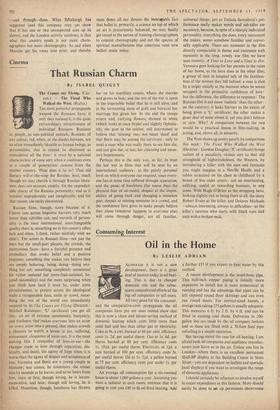Cinema
That Russian Charm
By ISABEL QUIGLY The Cranes are Flying. (Cur- zon.) — The Fiend Who Walked the West. (Rialto.) THE most powerful propaganda weapon the Russians have, if only they realised it, is the quite extraordinary attractiveness of individual Russians. Russians as people, as non-political animals, Russians of any colour, red, white, or the shades between, are so often immediately likeable as human beings, as personalities, that it cannot be dismissed as coincidence all the time : it must be a national characteristic of some sort, when it continues even at a couple of generations' remove from the mother country. What does it lie in? That old literary will-o'-the-wisp the Russian Soul, much though we may cherish it through Russian litera- ture, does not account, exactly, for the unpredict- able charm of the Russian personality; and so it remains unpredictable and inexplicable, and for that reason, too easily discounted.
Russian films, though, score because of it. Charm cuts across linguistic barriers very much better than subtitles can, and warmth of person- ality is the most international, interchangeable quality there is, something we in this country often lack and often, I think, rather wistfully wish we didn't. The actors in Russian films—not just the stars but the small-part players, the crowds, the anonymous faces—have a forceful presence and immediacy that evoke belief and a positive response; something that makes you believe they are people behaving, being, doing—doing any- thing but act; something completely unnational (or rather national but more-than-national, be- yond nationality) and the more surprising when you think how hard it must be, under some circumstances, to project across the ideological walls a recognisable face, smile or scowl, some- thing the rest of the world can immediately respond to. In The Cranes are Flying (Director : Mikhail Kalatozov; `1.J' certificate) you get all this : an air of extreme spontaneity, buoyancy, and freshness that makes everyone into an actor (or every actor into a person), that makes crowds a pleasure to watch, a lesson in joy, suffering, amusement, eloquence of some sort. It is the most moving film I remember of love-in-war—the changes made in love through separation, dis- 'loyalty, and death, the agony of hope when it is worse than the agony of despair and acceptance of loss. Veronica and Boris are a young couple in Moscow; war comes, he volunteers, she misses him by seconds as he leaves, and never hears from him, since at first, though loving, he is incom- municative, and later, though still loving, he is killed. Meantime, though, loneliness has thrown her on his worthless cousin, whom she marries and grows to hate; and the rest of the war is spent in the impossible belief that he is still alive, and in the tormenting sense of guilt and betrayal her marriage has given her. In the end the troops return and, carrying flowers, dressed in white (which looks at once bridal and slightly Ophelia- ish), she goes to the station, still determined to believe that `missing' may not mean 'dead' and that Boris may be among the survivors : only to meet a man who was really there to see him die, and can give her, at last, her cleansing and neces- sary hopelessness.
Perhaps this is the only way, so far, to treat the last war in films that will be seen by an international audience : at the purely personal level on which everyone can respond, since every- one has at some time suffered through separation, and the panic of loneliness (far worse than the physical fear of air-raids), despair at the impos- sibility of going back and changing a mistaken past, despair at missing someone in a crowd, and the confidence love gives to make people believe they alone (whatever happens to everyone else) will come through danger, are all familiar, universal things; just as Tatiana Samoilova's per- formance really makes words and sub-titles un- necessary, because, in spite of a sharply individual personality, everything she does, every movement she makes, seems somehow familiar and univer- sally applicable. There are moments in the film directly comparable in theme and treatment with moments in the long, rowdy war film we have seen recently, A Time to Love and a Time to Die. Veronica goes looking for her parents in the ruins of her home, as the hero does in the other film; a group of men in hospital talk of the faithless- ness of the women they left behind; a man is shot by a sniper exactly at the moment when he seems wrapped in the protective confidence of love : but the difference, the difference in response! The Russian film is not more 'realistic' than the other : on the contrary, it lacks horrors to the extent of being giVen a 'LP certificate; the other makes a great deal of noise about it, yet you don't believe or care. Why? A comparison between the two would be a practical lesson in film-making, in acting, and, above all, in sincerity.
The West shows up pretty poorly by comparison this week : The Fiend Who Walked the West (Director : Gordon Douglas; 'X' certificate) brings sadism of a peculiarly vicious sort to that old stronghold of highmindedness, the Western, by introducing a killer with the eyes and fantasies you might imagine in a Neville Heath, and a rabbit scratched on his chest in childhood by a brood of five older sisters : not an entertaining, edifying, useful or rewarding business, in any sense. With Hugh O'Brien as the strapping hero, looking slightly sick at being there at all, the slimy Robert Evans as the killer, and Dolores Michaels —always interesting, always in difficulties—as the killer's mistress who starts with black eyes and ends with a broken neck.


































 Previous page
Previous page